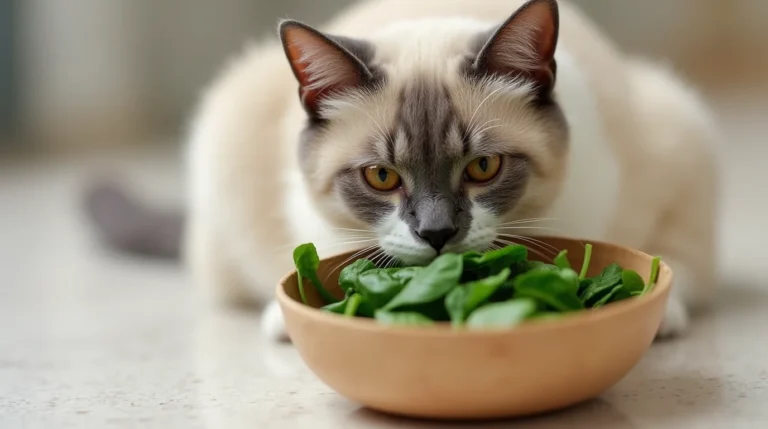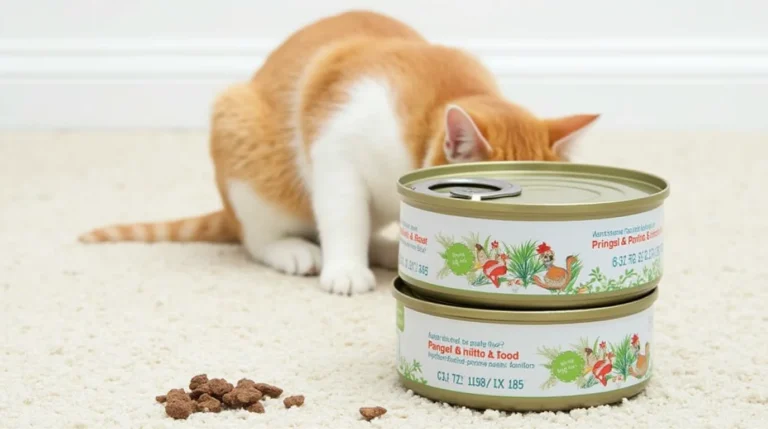Table of Contents
Introduction
Cats are curious by nature, often showing interest in the food their owners eat. If you enjoy asparagus, you might wonder: Can cats eat asparagus? The short answer is yes, but with caution. While asparagus is not toxic to cats, it’s not an essential part of their diet.
This article explores whether asparagus is safe for cats, the benefits and risks involved, and the best ways to serve it. By the end, you’ll have a clear understanding of whether or not asparagus is a good treat for your feline friend.
Can Cats Eat Asparagus Safely?
Yes, cats can eat asparagus, but only in small amounts. Unlike dogs, cats are obligate carnivores, which means their bodies require nutrients primarily from meat. While asparagus contains vitamins and fiber, it does not provide essential nutrients that cats require.
While asparagus is safe in small amounts, giving too much to a cat can cause digestive or urinary issues. That’s why it’s crucial to understand how and when to offer this vegetable to your pet.
Nutritional Benefits of Asparagus for Cats
Although asparagus is not necessary for a cat’s diet, it does offer some health benefits when given occasionally:
1. High in Fiber
Asparagus contains fiber, which can help with digestion. If your cat struggles with constipation, a tiny piece of asparagus may aid bowel movements.
2. Rich in Vitamins
This vegetable contains vitamins A, C, E, and K, which support overall health, including vision, skin, and immune function.
3. Low in Calories
Asparagus is a low-calorie food, making it a potential treat for overweight cats when given in moderation.
4. Contains Antioxidants
Antioxidants help combat oxidative stress and support a cat’s immune system.
While these benefits exist, they do not make asparagus an essential part of a cat’s diet. Instead, think of it as an occasional snack, not a dietary staple.
Potential Risks of Feeding Asparagus to Cats
Before offering asparagus to your cat, consider the possible risks:
1. Digestive Issues
Cats have a sensitive digestive system, and their bodies are not designed to process plant-based foods. Eating too much asparagus may lead to:
- Stomach upset
- Vomiting
- Diarrhea
2. Urinary Health Concerns
Asparagus is a bit acidic. This may not be good for cats with urinary tract infections (UTIs) or bladder stones. Some cats develop urinary crystals when their diet becomes too acidic or unbalanced.
3. Choking Hazard
Raw asparagus stalks can be tough and fibrous, making them difficult for cats to chew and swallow. If not cut into small pieces, they could pose a choking risk—especially for kittens or senior cats with weaker teeth.
4. Cooking and Seasonings
If you plan to share asparagus with your cat, avoid adding seasonings like salt, garlic, butter, or oil. Many human seasonings are harmful to cats, and some (like garlic and onions) are even toxic.
How to Safely Serve Asparagus to Cats
If you decide to let your cat try asparagus, follow these safety guidelines:
1. Serve in Small Portions
A small, bite-sized piece is enough. Start with a tiny amount and observe your cat’s reaction.
2. Cook It First
Raw asparagus is tough, so steaming or lightly boiling it makes it softer and easier to digest.
3. Avoid Spices and Additives
Only serve plain, unseasoned asparagus to your cat. Avoid butter, salt, garlic, or any other flavoring.
4. Monitor for Reactions
After feeding asparagus, watch for vomiting, diarrhea, or signs of discomfort. If your cat experiences any negative reactions, avoid feeding it again.
Can Kittens Eat Asparagus?
No, kittens should not eat asparagus. Their digestive systems are even more sensitive than adult cats, making it harder for them to process plant-based foods. Sticking to a meat-based diet for kittens best supports their growth and development.
Can Cats Eat Raw Asparagus?
Technically, cats can eat raw asparagus, but experts do not recommend it. Raw asparagus is harder to chew and digest, making it more likely to cause stomach discomfort. Cooking it slightly is a safer option.
How Much Asparagus Can a Cat Eat?
Cats should only eat a small piece once in a while. Asparagus should never replace their regular meat-based diet. If your cat enjoys it, offer it as an occasional treat, no more than once or twice a week.
Vegetables Cats Should Avoid
Not all vegetables are safe for cats. Here are some that should never be fed to felines:
- Onions and Garlic – Highly toxic and can cause anemia.
- Leeks and Chives – Belong to the same family as onions and are equally harmful.
- Mushrooms – Some wild mushrooms are toxic to cats.
- Rhubarb – Contains oxalates that can cause kidney issues.
Healthy Alternatives to Asparagus for Cats
To offer your cat a healthy, non-meat treat, consider these options:
- Cooked Chicken – A protein-rich and safe snack.
- Pumpkin – Good for digestion in small amounts.
- Carrots – Cooked and soft carrots are safe for cats.
- Blueberries – Some cats enjoy them as an occasional treat.
Frequently Asked Questions
1. Can cats eat asparagus every day?
No, asparagus should be an occasional treat, not a daily food item.
2. Can cats eat asparagus soup?
No, most soups contain seasonings, garlic, or onions, which are toxic to cats.
3. Do cats actually like asparagus?
Some cats may show curiosity about the texture, but most do not naturally feel drawn to vegetables.
4. Can asparagus make my cat sick?
Yes, if fed in large amounts, asparagus can cause digestive upset like vomiting or diarrhea.
5. What should I do if my cat eats too much asparagus?
Monitor your cat for any signs of illness. If they seem unwell, contact your veterinarian.
Conclusion
So, can cats eat asparagus? Yes, but only in small, controlled amounts. While it offers some fiber and vitamins, it’s not essential for a cat’s diet. They should meet their nutritional needs through meat-based foods.
If your cat enjoys asparagus, serve it plain, cooked, and in small portions while monitoring for any negative reactions. And remember—when in doubt, always check with your veterinarian before introducing new foods.







